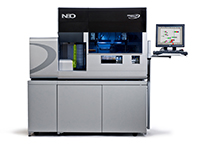◄ Back to Blood Service in Brief July 2016
One of the many important tests we conduct at the Blood Service is the routine screening of donors for red cell antibodies to prevent incompatible blood transfusion to patients. Soon, we’ll be rolling out new automated testing technology to make this process quicker.
Currently, our routine red cell antibody screening uses aging technology and we perform some red cell antibody tests manually. Manual tests include initial investigation of positive or indeterminate antibody screen results, initial investigation of ABO and RhD anomalies, and routine red cell phenotyping.
By early 2017, we aim to have introduced the fully automated Immucor NEO analyser in all our processing centres nationwide. The new technology will speed up donor testing as well as add more flexibility and improve productivity. This new system requires fewer manual processes, fewer instruments and less manual data entry, while providing a higher sample throughput. This will increase laboratory efficiency and create opportunities to automate our red cell phenotyping program and increase the number of donations tested to provide a better service for our customers.
The major point of difference of the new analysers is the use of solid phase technology, which consists of microplates coated with red cell membranes and is a more stable reagent than the current technology.
Angelo Margaritis, Automated Systems Program Manager, is responsible for implementation of the new system and is excited that it’s nearly here. “This new system will reduce many of the manual elements of our red cell antibody screening, making the process more efficient,” he said.
“It represents another step forward in the Blood Service using leading edge technology to ensure we provide the right products at the right time for our customers.”
Photo: The new analyser will make testing faster and more efficient. Image supplied by Seqirus.

